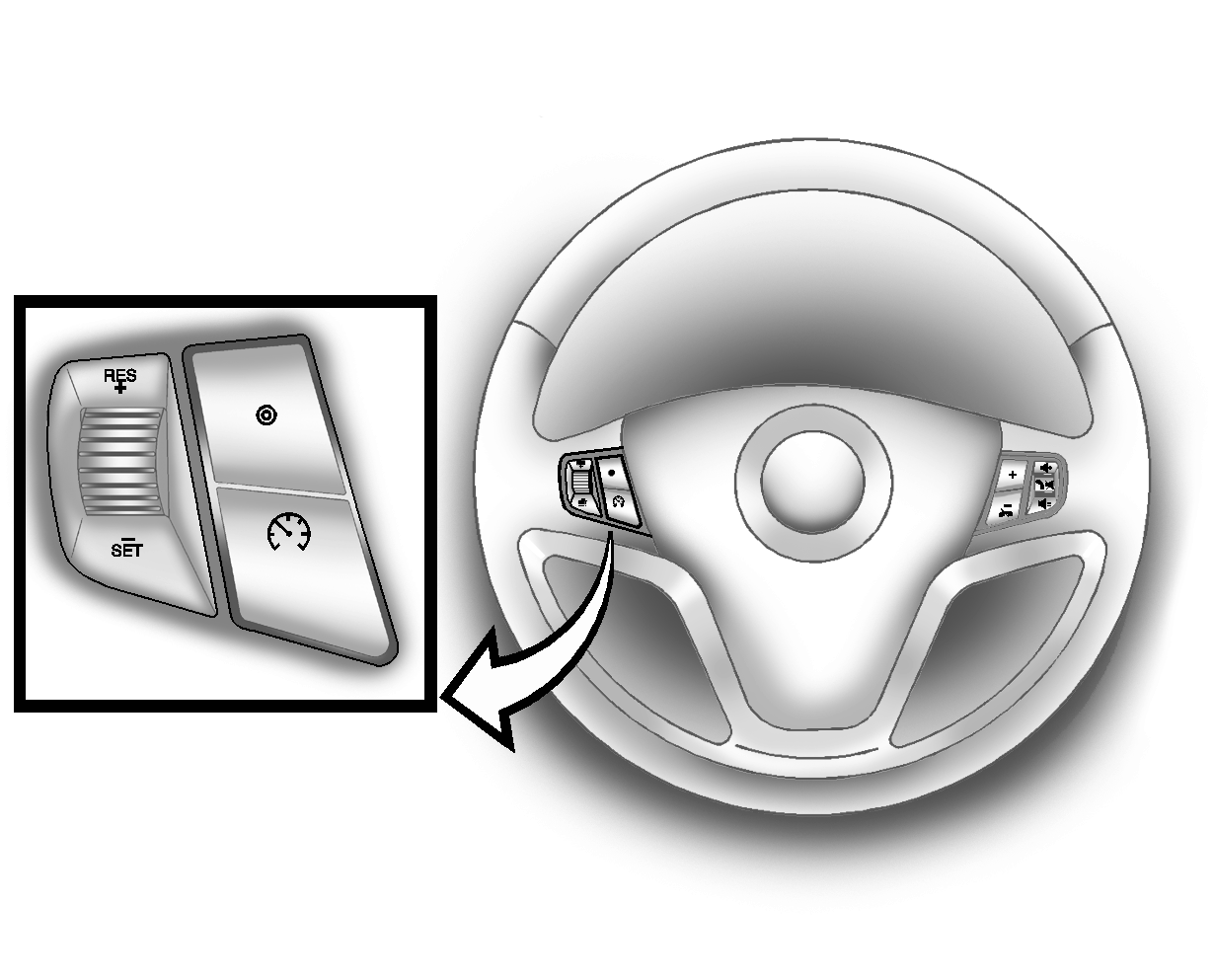With cruise control, the vehicle can maintain a speed of about 25 mph (40 km/h) or more without keeping your foot on the accelerator. Cruise control does not work at speeds below 25 mph (40 km/h).
On vehicles with the StabiliTrak® feature, the system may begin to limit wheel spin while you are using cruise control. If this happens, the cruise control will automatically disengage. See StabiliTrak® System.
Caution: Cruise control can be dangerous where you cannot drive safely at a steady speed. So, do not use the cruise control on winding roads or in heavy traffic.
Cruise control can be dangerous on slippery roads. On such roads, fast changes in tire traction can cause excessive wheel slip, and you could lose control. Do not use cruise control on slippery roads.Setting Cruise Control
Caution: If you leave your cruise control on when you are not using cruise, you might hit a button and go into cruise when you do not want to. You could be startled and even lose control. Keep the cruise control switch off until you want to use cruise control.

The cruise control buttons are located on the left side of the steering wheel.
(On/Off): Press to turn the cruise control system on and off. An indicator light comes on.RES+ (Resume/Accel): Move the thumbwheel up to resume a set speed or to accelerate to a higher speed.
-SET(Set/Coast): Move the thumbwheel down to set a speed or to decrease the speed.
To set a speed:
- Press to turn cruise control on. The indicator light on the button comes on.
- Get to the speed desired.
- Press the thumbwheel toward -SET and release it.
- Take your foot off the accelerator pedal.
When the brakes are applied, the cruise control shuts off.
Resuming a Set Speed
If the cruise control is set at a desired speed and then the brakes are applied, the cruise control is disengaged. The indicator light on the instrument panel cluster goes out when the cruise is no longer engaged. To return to the previously set speed, press the thumbwheel up toward RES+ briefly when the vehicle has reached a speed of about 25 mph (40 km/h) or more.
This accelerates the vehicle to the previously selected speed.
Increasing Speed While Using Cruise Control
To increase the cruise speed while using cruise control:
| • | Move the thumbwheel up toward RES+ and hold it until the vehicle accelerates to the desired speed, and then release the switch. |
| • | To increase the speed in small amounts, move the thumbwheel up toward RES+ briefly and then release it. Each time this is done, the vehicle goes about 1 mph (1.6 km/h) faster. |
| • | Use the accelerator pedal to reach the desired speed and move the thumbwheel towards -SET. The new desired speed must be greater than the previous set speed by at least 5 mph. |
Reducing Speed While Using Cruise Control
If the cruise control system is already engaged,
| • | Move the thumbwheel toward -SET and hold until the desired lower speed is reached, then release it. |
| • | To slow down in very small amounts, move the thumbwheel toward -SET briefly. Each time this is done, the vehicle goes about 1 mph (1.6 km/h) slower. |
Passing Another Vehicle While Using Cruise Control
Use the accelerator pedal to increase the vehicle's speed. When you take your foot off the pedal, the vehicle will slow down to the previously set cruise control speed.
Using Cruise Control on Hills
How well the cruise control works on hills depends upon the vehicle's speed, load, and the steepness of the hills. When going up steep hills, you might have to step on the accelerator pedal to maintain the vehicle's speed. When going downhill, you might have to brake or shift to a lower gear to maintain the vehicle's speed. For some vehicles the transmission may automatically downshift when going down hills to help maintain the vehicle's speed. When the brakes are applied the cruise control shuts off.
Ending Cruise Control
There are three ways to disengage the cruise control:
| • | Step lightly on the brake pedal or clutch; when cruise control disengages, the indicator light on the instrument panel cluster goes out. |
| • | Press to turn off the cruise control system. |
Erasing Speed Memory
The cruise control set speed memory is erased when the cruise control or the ignition is turned off.
